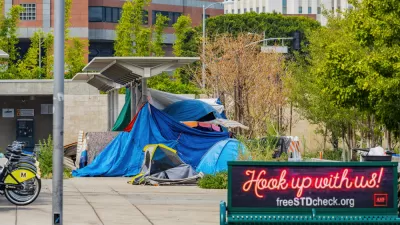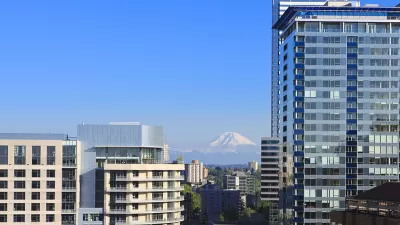As gas prices have fallen, driving has increased. October driving mileage figures show an increase of 3 percent from a year earlier. A shift away from public transit may cause transit providers to rethink expansion plans.
"It is too soon to say whether those Americans who are driving more are forgoing public transit, but an extended run of low gas prices could change the cost calculus for transit riders," writes Eric Morath covers the economy for The Wall Street Journal.
It's not too soon to see the results in Los Angeles, though. "(I)in fact, for every month that gas prices declined in 2014, so did the Los Angeles County Metropolitan Transportation Authority's ridership figures," writes transportation reporter Laura J. Nelson in the Los Angeles Times. "In the second half of the year, the number of riders systemwide fell by 4% compared with 2013."
But, experts say, don't be fooled: Although there appears to be a connection, correlation is not causation.
"Falling gas prices don't lead to much of a decrease in ridership, if any," Marlon Boarnet, a USC urban planning professor, said. "You're looking at zero to two percentage points change, at most."
Interestingly, many of the transit providers interviewed by Morath don't seem particularly concerned by the lowest gas prices in almost six years. Among the reasons: "(H)istorically, consumers were more likely to shift behavior in response to energy prices rising, rather than falling, transit experts say." In Los Angeles, "four in five Metro riders don't have access to a car, so low fuel prices won't significantly affect ridership," writes Nelson.
However, ridership has been increasing in recent years with rising gas prices. If that trend halts due to plummeting gas prices, the "shift could boost pressure on governments to re-evaluate their expansion plans for buses, subways and trains amid limited funding for infrastructure spending," notes Morath.
In fact, he points to states and cities that have already seen shifts in infrastructure investment spending resulting from failed ballot measures and political changes that took place last year.
On the local level, most transit-funding initiatives passed last year, but voters in Kansas City, Mo., and Austin, Texas, rejected measures intended to pay for transit expansion. Maryland elected a governor who favors road improvements over extending rail lines in Baltimore and elsewhere in the state.
One thing many may agree on, though, is that with the "Energy Information Administration (EIA) expecting prices to stay below $3 until at least 2017, this year is set to be a bellwether for public transportation," as Jacob Anbinder, a policy associate at The Century Foundation, the New York-based think tank, writes in The Week.
Note: Subscriber-only content to The Wall Street Journal article may be available to non-subscribers for up to seven days after Jan. 29.
FULL STORY: Transit Agencies Brace for Low Gas Prices to Siphon Away Riders

Trump Administration Could Effectively End Housing Voucher Program
Federal officials are eyeing major cuts to the Section 8 program that helps millions of low-income households pay rent.

Planetizen Federal Action Tracker
A weekly monitor of how Trump’s orders and actions are impacting planners and planning in America.

Ken Jennings Launches Transit Web Series
The Jeopardy champ wants you to ride public transit.

Driving Equity and Clean Air: California Invests in Greener School Transportation
California has awarded $500 million to fund 1,000 zero-emission school buses and chargers for educational agencies as part of its effort to reduce pollution, improve student health, and accelerate the transition to clean transportation.

Congress Moves to End Reconnecting Communities and Related Grants
The House Transportation and Infrastructure Committee moved to rescind funding for the Neighborhood Equity and Access program, which funds highway removals, freeway caps, transit projects, pedestrian infrastructure, and more.

From Throughway to Public Space: Taking Back the American Street
How the Covid-19 pandemic taught us new ways to reclaim city streets from cars.
Urban Design for Planners 1: Software Tools
This six-course series explores essential urban design concepts using open source software and equips planners with the tools they need to participate fully in the urban design process.
Planning for Universal Design
Learn the tools for implementing Universal Design in planning regulations.
Heyer Gruel & Associates PA
Ada County Highway District
Institute for Housing and Urban Development Studies (IHS)
City of Grandview
Harvard GSD Executive Education
Toledo-Lucas County Plan Commissions
Salt Lake City
NYU Wagner Graduate School of Public Service





























